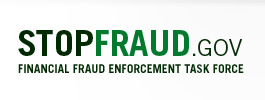
I want to learn how to protect myself from:
There are many types of fraud. We’ve gathered some publications and web sites to share information and help educate the public concerning financial fraud activities and ways to protect yourself. The information collected on these types of fraud is organized in four categories when possible:
Resources on How to Protect Yourself – these documents have actionable steps you can take to identify fraud, protect yourself, or report suspicious activity.
Related Organizations and Web Sites – Additional web resources on the topic.
Reports – Studies further identifying, analyzing, and measuring the topic.
Publications – Brochures, pamphlets, or books devoted to the topic.
Health/Medicare Fraud
Health or medical fraud is the purposeful billing Medicare for services that were never provided or received.Identity Theft/Privacy Issues
Identity theft is the use of another’s personal information without permission — like their name, Social Security number, or credit card number — to commit fraud or other crimes.Mass Marketing, Mail, Wire, Telephone and Internet Fraud
Mass Marketing Frauds target individuals of all ages and walks of life. Victims are lured with false promises of significant cash prizes, goods, services, or good works, in exchange for up-front fees, taxes or donations.Criminals use mail, phone, and internet to commit many different types of fraud, including sweepstakes and lottery frauds, loan fraud, phishing scams, buying club memberships, credit card scams, identity theft, and more. All of these types of fraud fall under this category.
Wire Transfer Fraud consists of using wire communications in a scheme to defraud the following: wire transfers of monies to or from a financial institution; electronic mail (e-mail) communications; facsimile (FAX) transmissions; and radio or television communications.
Mortgage, Loan, Lending and Related Fraud
Mortgage scams and frauds include traditional mortgage fraud, foreclosure rescue scams, loan modification scams, and reverse mortgage scams.Securities and Commodities Fraud
Securities Fraud covers a wide range of illegal activities, all of which involve the deception of investors or the manipulation of financial markets.Tax Fraud
Any misrepresentation of the tax laws or effort to undermine the integrity of the tax system to the gain of a person or business at the expense of the federal government.Other Types of Fraud
Charity Fraud: Scam artists representing themselves as a charitable organization and using similar techniques to request donations as telemarketing, direct mail, email and online ads.Job Scams: Scam artists who promise a job, access to special job listings, interviews, or a way to make a big income working from home for a fee or for credit or debit card information.




